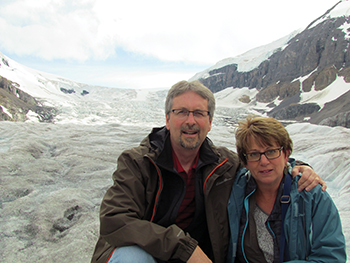Throat Cancer Survivor
Survivor credits immunotherapy with saving his life

Bill McCone was devastated after receiving a diagnosis of Stage IVA squamous cell carcinoma of the throat at 51. When his first treatment failed, his doctor offered the possibility of an immunotherapy clinical trial. He jumped at the chance and liked the opportunity of helping future head and neck cancer patients. Today, the cancer is undetectable, and he and his wife are traveling and enjoying life.
While shaving one morning, I found a lump on the left side of my neck that warranted a visit to my primary care doctor. After examining it, he was concerned enough to send me to an ENT. A CT scan showed the lump was an enlarged lymph node, and a biopsy determined it was squamous cell carcinoma but he was unsure of the origin.
Needing more information, I contacted a cancer hospital recommended by a friend who had been treated for breast cancer there. More testing discovered the cancer was in my left tonsil. A laparoscopic biopsy of my tonsil confirmed it was Stage IVA squamous cell carcinoma caused by HPV.
It felt like my whole world stopped while everyone else’s lives were chugging along like normal. But, I felt confident in this cancer center, which was also a teaching hospital. Working with their oncologists gave me the hope I needed to keep going.
The oncologist there gave me several treatment options: platinum chemotherapy, surgery or targeted therapy plus radiation therapy. The side effects of chemotherapy frightened me. There was a risk of hearing loss, and a hearing test showed I already had high frequency hearing loss. Surgery could damage the nerves in my neck and could affect my ability to raise my left arm. So, I chose the option that combined targeted therapy with radiation therapy.
To begin, I received a port and started targeted therapy, was fitted for a fiberglass radiation mask and had three dots tattooed on my throat to pinpoint exactly where the radiation beams needed to go. Two weeks later, I started radiation therapy for five days a week and twice on Friday. Each session was about 20 minutes.
A little over a week after radiation began, I lost my sense of taste, my throat felt burned, I had blisters in my mouth and my neck was red. It became difficult to eat, and I started losing weight. I took pain medication and switched to nutrient supplement drinks. According to my doctor, I needed to drink seven a day to get the nutrients needed to avoid having a feeding tube. At first, I thought it would be easy but realized quickly that drinking that much was a challenge. Determined to succeed, I set my alarm for every two hours as a reminder to drink another one.
Three months later on a Friday, I had a PET scan. The radiologist told me the scans showed no signs of cancer. I went home and celebrated with my family. But on Monday, my doctor called and said after further examination, she could see a nodule in my lung. We waited for three more months to see whether the nodule would go away on its own, but the next scan showed the nodule had doubled in size and more spots had shown up in my lung.
This was a low point for me. My wife and I looked at the doctor and asked, “What now?” She gave me two options. I could go on platinum chemotherapy for the rest of my life, which she estimated at about a year, or I could join a clinical trial.
I thought, “Why not?” A clinical trial could work, and my participation alone might help someone else with cancer down the road. It took less than a day to make my decision, and I was the second to last person to join a trial that was testing an immunotherapy.
Every three weeks, I received the immunotherapy treatment by infusion, and surprisingly didn’t have any side effects.
To monitor the effectiveness of the immunotherapy, I had regularly scheduled CTs. The first showed that tumors were shrinking. A few months later, no cancer could be detected on a scan. I felt it truly was a miracle! I did not expect to have such amazing results.
I had CTs every four weeks for two years before moving to an annual schedule. The trial continues to follow my progress, but I’m back with my regular oncologist.
Throughout everything, my family surrounded me with support, and I looked into several support groups. It took a few tries, but eventually I found one just right for me. That helped with the mental part of facing head and neck cancer.
I highly recommend vaccinating your children against HPV so they don’t have to go through what I did. I never recalled having an HPV infection, so I never knew I had it. Prior to discovering my cancer, we had our two daughters vaccinated. After my experience, we realized our son needed to be, too, and we had him vaccinated as well. Prevention is key!
Bill's advice
- Go to a hospital that specializes in cancer. They have the expertise you will need.
- Learn all you can about your diagnosis.
- Get a second opinion so you can make the best decision for you.
- Be open to joining a clinical trial.
- Find emotional support. For me, the physical part of head and neck cancer was easier than the mental part.


